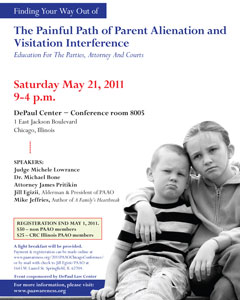Archivist and Principle Researcher, University of Illinois
 April is Parental Alienation Awareness Month, a great reminder to all of us about the dangers of this form of abuse.
April is Parental Alienation Awareness Month, a great reminder to all of us about the dangers of this form of abuse.
Parental alienation is an act by a parent that tries to denigrate and destroy the relationship between a child and the other targeted parent. (Read my related column “10 Facts About Parental Alienation.”)
Parental Alienation Syndrome is commonly referred to as the effect of parental alienation.
A conference I attended last year, the Canadian Symposium for Parental Alienation Syndrome, focused on the state of research, intervention, and the status of Parental Alienation Syndrome for inclusion in the fifth edition of Diagnostic and Statistical Manual of Mental Disorders (DSM-5).
DSM-5 is published by the American Psychiatric Association (APA) and provides a common language and standard criteria for the classification of mental disorders. The DSM-5 is scheduled for release in 2013.
Participants came from around the world and many were at the conference as the targeted parent of PAS. Surprisingly, more than half were women.
There were a few presentations I would like to mention since the issue of parental alienation syndrome is so timely. DadsDivorce.com covered the conference and spoke with many of the featured speakers if you would like more information on parental alienation.
The first speaker, Dr. William Bernet, talked about the status of the petition to include PAS into DSM-5. He is a principle writer of the petition.
The definition of PAS as submitted to the DSM-5 Task Force of the APA is when a child with parents engaged in a high conflict divorce allies himself strongly with one parent (preferred parent) and rejects a relationship with the other parent (alienated/targeted parent) without legitimate justification.
In situations of abuse or neglect the rejection is considered reasonable/justified. It is identified as estrangement as opposed to alienation.
The APA in reviewing a petition for inclusion has three criteria. The petition must show that the diagnosis is valid, reliable and prevalent. Dr. Bernet gave 20 reasons why PAS meets the criteria for inclusion.
Historically, the condition was described before formally defined as PAS. PAS has been described independently by at least 6 researchers during 1980-1990. It is almost universally accepted among experts. There is international recognition in over 30 countries. PAS is a crime in Brazil. Reliability has been demonstrated using the Test-Retest model.
Furthermore, Inter-rater correlation has consistently been .89-.95. Prevalence is estimated to be 1% of the population (.20 divorce x .20 high conflict x .25 PA). Please see “Parental Alienation, DSM-V and ICD-11” for a complete report on PAS and the petition for inclusion in DSM-5 by Dr. Bernet.
The petition was submitted in November 2009. No decision has been made yet. Initial feedback has been negative to include it as a “mental disorder.”
However, it is much more optimistic that it will be accepted for inclusion as a “relational problem.” It can also be included in the Appendix under “Criteria Sets and Axes for Further Study.”
The good news is that no matter where it is included in the DSM it will have legal weight in the court.
Managing PAS cases from an attorney’s perspective with judicial ramifications was discussed throughout the conference. Speaker Brian Ludmer said that the attorney must be knowledgeable in law and research. He suggested that a case must be prosecuted swiftly since a Judge is more likely to act boldly early during a case.
He encourages the judge to intervene as a case manager. Traditional diversions such as “light” therapy, mediation, Guardians ad Litem, etc., do not work. Goal-oriented reconciliation therapy that directly tackles the dynamic of PAS is the only effective way to go.
Ludmer noted that although deficiencies in the targeted parent may contribute to PAS they rarely rise to the level of material causes. (Please see Mr. Ludmer’s slides for a fuller treatment of “Managing the Parental Alienation Case.”)
Dr. Demosthenes Lorandos is both a psychologist and an attorney. His advice on preparing for PAS cases also requires the attorney to read the scientific research. Frick, Silverthorn & Evans wrote about “Anxious Parents” (1994).
They show how with the proper encouragement children can recall non-existent memories. Children respond to the implicit demand characteristics of the situation. They pick up the cues, such as repeated leading questioning to try to get the “right” answer.
Interaction with parents tends to lead more to contaminant of memories than with strangers. Children change minds frequently when suggested by parents. Affect and story are disconnected. Horrific events are recalled without emotion.
Even court experts can impact a child’s memory. An untrained therapist in PAS will not attempt reality testing. They will give cues by asking without investigation, i.e. “So, when were you abused?”, thus already confirming what has not yet been determined.
The keynote speaker was Dr. Amy Baker. She talked about the material from her seminal book, “Adult Children of PAS.”
One of her main points is it’s similarity in etiology and manifestation with cultic groups. Dr. Baker described five salient behavioral features of the manipulation techniques employed by the alienating parent:
- Relentless denigration of the targeted parent.
- Creating the impression that the targeted parent is dangerous.
- Misrepresenting the targeted parent’s feelings for the child.
- Withdrawing love if the child indicated affection for the targeted parent.
- Erasing the targeted parent from the life and mind of the child.
Strategies to achieve this include bad-mouthing, limiting contact, telling the child that the targeted parent doesn’t love him or her, forcing child to choose between parents.
Baker provided a table outlining the strategies used to alienate a child from a targeted parent. According to her study, at least six major areas of functioning were identified as effects of PAS (“Adult Children of PAS”, op. cit., pgs. 179-192):
- Low self-esteem (n=26, 65%)
- Depression (n=28, 70%)
- Drug and alcohol problems (n=14, 35%)
- Lack of trust (n=16, 40%)
- Alienated from their own children (n=14, 50%)
- Divorce (n=23, 57.5%)
Dr. Baker distinguished between PAS and rejection of parent due to abuse. A child who has been abused by a parent typically does not outright reject that parent. The child tends to blame himself and does not broadcast the abuse. Furthermore, the child does not deny the positive aspect of that parent nor worships the other parent.
Critics say that PAS as a disorder harms women; it is a tool for abusive fathers. However, PAS recognized as a disorder can also help protect women by providing specific etiological criteria as required by the tenets of the APA.
Dr. Baker noted that a trained therapist can easily distinguish PAS from abuse (estrangement) by following the criteria. In a clinical trial Baker was able to correctly make the distinction in 90% of the cases presented.
One thing that stands out regarding the conference is the number of women who were attending as targeted parents. It is easy to see that this is not so much a gender issue as rather a power issue. And where there’s power there’s psychopathology.
I would like to recommend that you register for a very special workshop co-sponsored by DePaul Law Center and Parental Alienation Awareness Organization (PAAO). It is called “Finding Your Way Out of the Painful Path of Parent Alienation and Visitation Interference: Education for the Parties, Attorney and Courts.”
It is being held on Saturday, May 21, in Chicago.
Speakers include Judge Michele Lowrance, Dr. Michael Bone, attorney James Pritikin (whose recently had successful child custody litigation in proving false memory implanted in the child allegedly abused by the child’s parent, NBA star Dwayne Wade), Jill Egizii (author, alderman and PAAO President) and author Mike Jefferies. A light breakfast will be provided.
For more information, please visit the PAAO 2011 Chicago Conference on Parental Alienation website.
 My name is Robert Ferrer. I am a researcher and archivist at the University of Illinois Urbana-Champaign. Although it is in Computer Science, I also apply the same heuristic principles in my interests in child development and family law. As such I’ve been working with the Children’s Rights Council of Illinois and Illinois Fathers in providing the background information in law and child development research for various endeavors. I have been collecting, reading and pondering the wealth of information dealing with divorce and children from many perspectives, including child development, family studies and law.
My name is Robert Ferrer. I am a researcher and archivist at the University of Illinois Urbana-Champaign. Although it is in Computer Science, I also apply the same heuristic principles in my interests in child development and family law. As such I’ve been working with the Children’s Rights Council of Illinois and Illinois Fathers in providing the background information in law and child development research for various endeavors. I have been collecting, reading and pondering the wealth of information dealing with divorce and children from many perspectives, including child development, family studies and law.
I’ve been attending the sessions of the Illinois Family Law Study Committee where they are currently reviewing current statutes for massive revisions. I’ve been in communications with many of its members and have established a collegial relationship. I have attended conferences on Contemporary Families, PAS and ADR. I have written several proposals in the attempt to mitigate parental loss, more fully integrating current research with proposed policy.

